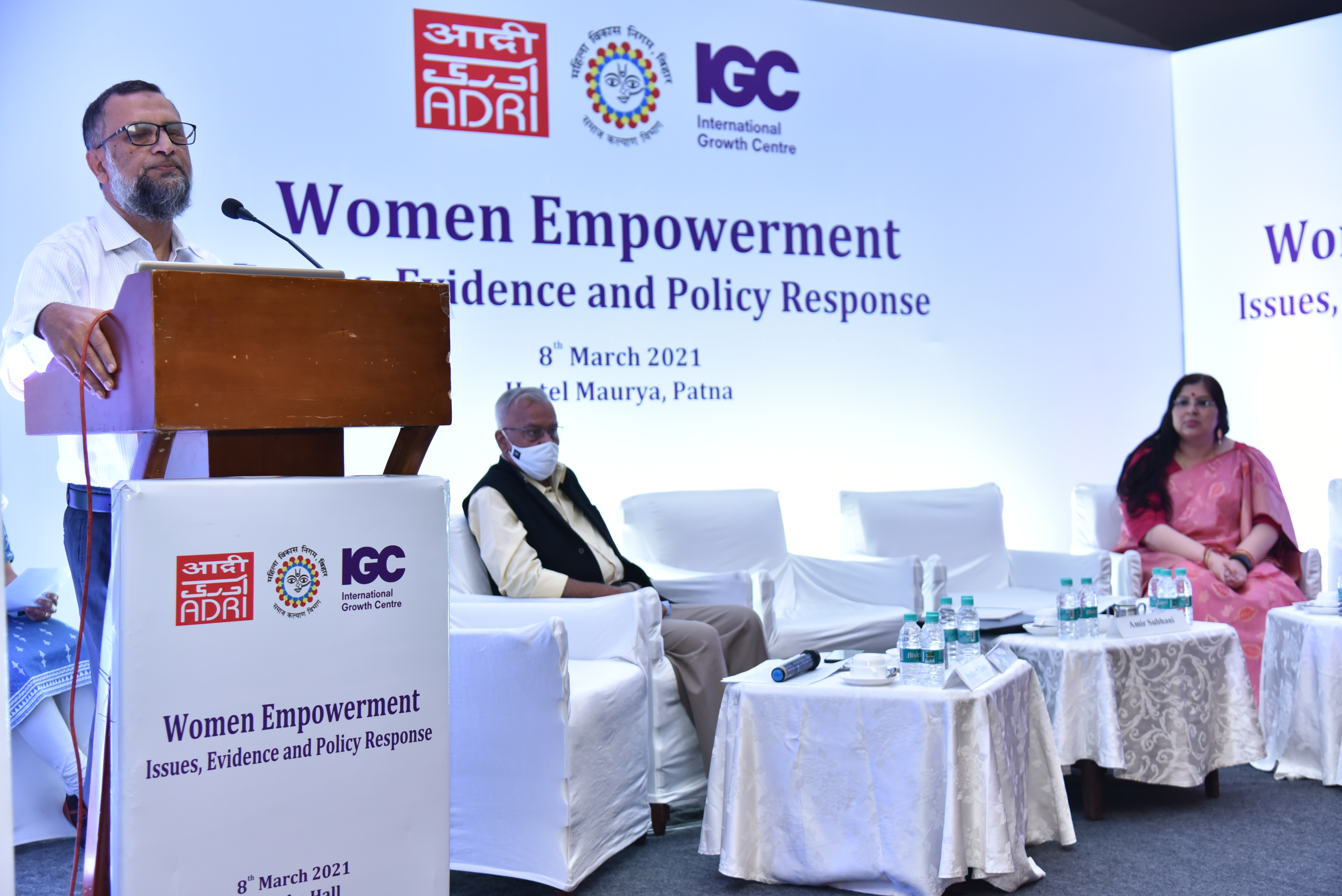Events of IGC

International Growth Centre of the London School of Economics and Asian Development Research Institute, in collaboration with Women Development Corporation, Government of Bihar is organising a Conference on "Women Empowerment - Issues, Evidence and Policy Response" on 8th March 2021 from 9.30 AM at Hotel Maurya, Patna.
Patna, March 8. The International Growth Centre (IGC) and Asian Development Research Institute (ADRI) in collaboration with Women Development Corporation, Government of Bihar organised a Conference to celebrate International Women Day titled “Women Empowerment - Issues, Evidence and Policy Response”. The conference was inaugurated by Amir Subhani (IAS) – Development Commissioner, Government of Bihar and Harjot Kaur Bamhrah (IAS) – Managing Director, Women Development Corporation (WDC), Government of Bihar.
As part of the Conference, Prof Prabhat Ghosh, Member Secretary ADRI stated that Bihar has had a mixed performance in closing gender gaps. While gender gaps in elementary schooling have narrowed, maternal mortality has declined, women and men have the same types of jobs, and child sex ratio has improved; adult women in Bihar remain twice as likely to be illiterate than adult men, and female labour force participation in the state is lowest in the country (World Bank Group, 2016). On NITI Aayog’s SDG India Index spanning across 13 SDGs and 62 priority indicators, Bihar has a composite score of 48 over a range of ‘0’ and ‘100’, according it an ‘aspirant state’ status alongside only two other states – Assam and Uttar Pradesh.
Anu Rammohan, Professor of Economics at University of Western Australia stated that the female labour force participation rate in India is declining and is now below 25% for women as compared to 82% for men. She said that constraints faced by women in the post-Covid world would include more violence, a lack of access to Internet services and inability to seek out new jobs. Professor Rammohan’s Special Lecture was chaired by Dr. N Vijaya Lakshmi, Principal Secretary, Sugarcane Industry Department, Government of Bihar. She shared Government of Bihar initiatives Gram Varta and WDC intervention to sensitize the front-line workers.
In the inaugural session, Shree Amir Subhani, Development Commissioner, Government of Bihar lauded Bihar’s improvement in the socio-economic indicators given out in the latest NFHS report. He said that the Total Fertility Rate in Bihar had come down from 3.4 to 3. However, there was a decline in the sex ratio at birth. He attributed this to the illegal sex-determination centres that were leading to female foeticide. The government is working towards raising awareness in the mindset of people so that they would resist female foeticide. Harjot Kaur Bamhrah, Managing Director, Women Development Corporation, Government of Bihar reported on the different steps taken by the Bihar government to empower women. She said that 54 lakh girls had been given scholarships which amounted to 510 crore rupees. A scheme of financial literacy that has been introduced would address problems faced by women who were out of school.
In an IGC India Special Lecture, Jyotsana Jha, Director, Centre for Budget and Policy Studies opined that there was a definite movement towards greater gender equality. She pointed out that there is less preference for boys in areas where the female labour force participation rate goes up. This was followed by a panel discussion christened Women Economic Empowerment: Constraints and Solutions. It was chaired by Harjot Kaur Bamhrah and co-chaired by Devesh Sehra, Secretary, Department of Scheduled Caste and Scheduled Tribes. Sehra stated that only 16 % of the women in India could retain their jobs in the Covid era as compared to 60% men due to higher costs for companies in keeping women in their jobs. In this session, Dr. Ashmita Gupta, Assistant Professor, ADRI said that there is a need to re-examine the kind of growth that we want. Earlier, there was jobless growth in India where a lot of women lost out in getting manufacturing jobs. The other participants in the Panel Discussion were Niveditha Menon, Senior Research Advisor, Centre for Budget and Policy Studies, Paramita Majumder, Former Gender Budget Expert, Ministry of Women and Child Development, Government of India and Sugandha Munshi, Gender Specialist, International Rice Research Institute.
Another panel discussion titled Gender and Health: Issues, Evidence and Policy Response took place later and was chaired by Dr. N. Vijaya Lakshmi. The moderator was Dr. Ashmita Gupta and the panellists were Nafisa Binte Shafique, Chief of Field Office, UNICEF, Bihar, Nandita Bhan, Research Scientist, Centre on Gender Equity and Health, University of California, San Diego, Padma Deosthali, Senior Advisor, CEHAT, Saswata Ghosh, Associate Professor, Institute of Development Studies, Kolkata and Vikash Nath, Program Specialist, Ekjut India. In the concluding panel discussion on women, agriculture and co-operatives, Bandana Preyashi, Secretary, Co-operative Department, Government of Bihar spoke as the Chair. The discussion was moderated by Professor Prabhat P Ghosh, Member Secretary, ADRI and other participants were Shikha Srivastava, Managing Director, COMFED and Sugandha Munshi.
Professor Prabhat P Ghosh stated that the state of Bihar presents an interesting case, where increasing education levels among women, and the existence of several Government programs to enhance women’s participation in the economy, have not coincided with an increase in women’s labour force participation rate (LFPR). Harjot Kaur Bamhrah gave the concluding remarks.